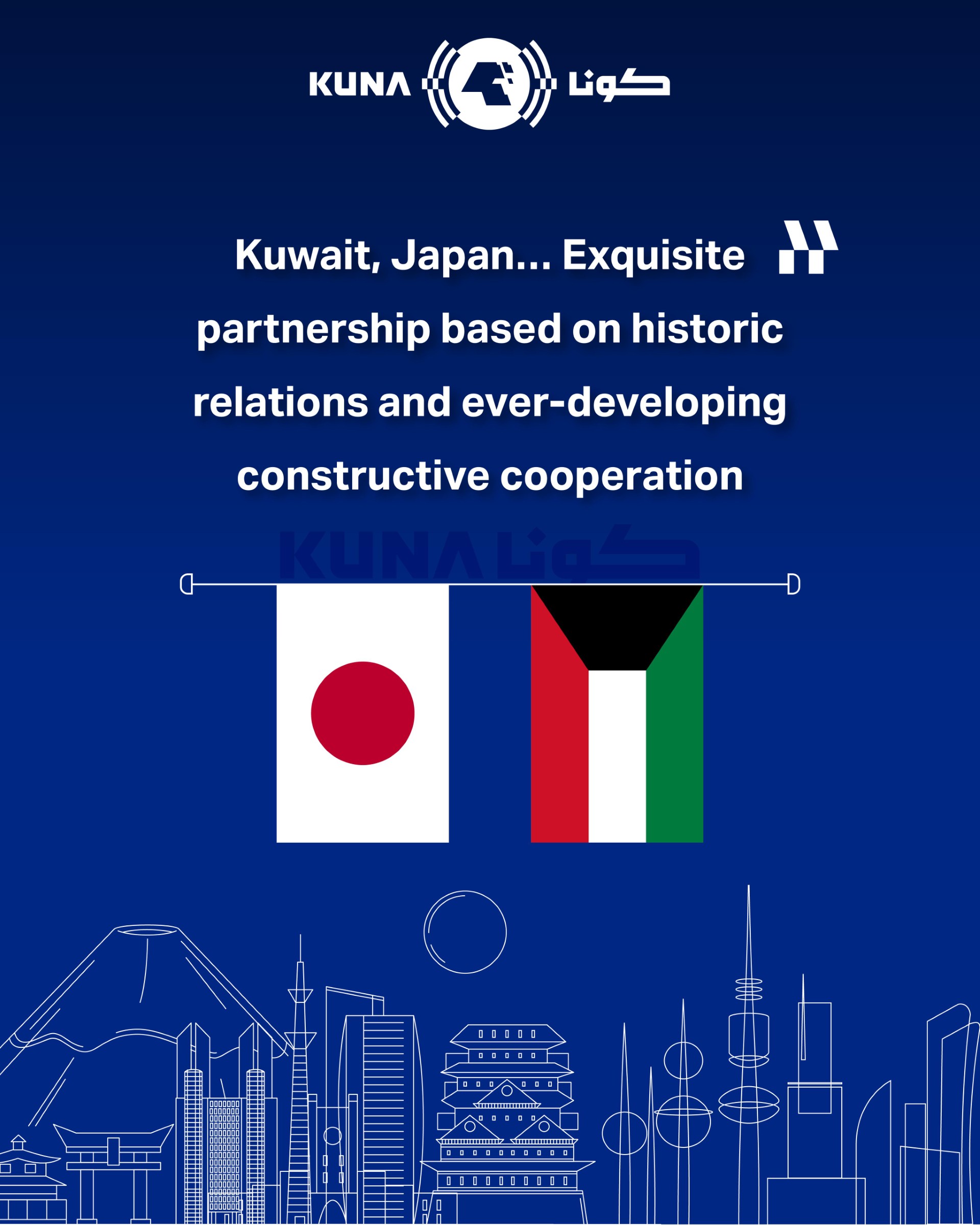LOC13:41
10:41 GMT

News report
KUWAIT, May 29 (KUNA) -- Kuwaiti-Japanese relations have been developing for around 65 years, leading to constructive cooperation and exquisite partnership, based on the principles of mutual respect and shared interests.
These relations have been beefed up through the official visits of both friendly countries' wise leaderships and senior officials, in addition to the conclusion of agreements and memos of understanding covering various domains.
The ongoing historical visit paid by His Highness the Crown Prince Sheikh Sabah Khaled Al-Hamad Al-Sabah to Japan reflects longstanding cooperation and joint understanding between both countries and peoples, as well as willingness to push them forward, especially in the economic realm, up to more comprehensive and integrated levels.
Kuwait and Japan are tied with historical bonds that started with the economic field in the fifties when the late Amir Sheikh Abdullah Al-Salem Al-Sabah agreed in 1958 to grant Japan's Arabian Oil Company Ltd the concession to explore oil at the Submerged Area or the Neutral Zone.
Three years later, Japan was in the forefront of those countries that had recognized Kuwait's independence through a cabinet decree on December 8, 1961, in spite of Iraqi economic sanctions on Japanese exports.
The Japanese move was based on balanced interests with Kuwait, particularly after Japan had obtained the concession to use Kuwait's oil share in the divided zone with Saudi Arabia.
The concession came to an end in September 2001 under a memo of understanding. The Kuwait Gulf Oil Company then started operating in the joint offshore oil fields.
Bilateral diplomatic ties were forged in February 1962, when the first Kuwaiti Ambassador to Japan, Sulaiman Mohammad Al-Sanea, arrived in Tokyo, and the Japanese embassy was inaugurated in Kuwait in March, 1963.
Japanese commercial missions had been present in Kuwaiti markets since 1961 to study markets of Gulf States.
Afterwards, both sides commenced cooperative relations in several areas, including cooperation between Kuwait Gulf oil Company and Arabian Oil Company by signing agreements for providing Japan with part of the production of the divided area and helping Kuwaiti companies make use of the Arabian Oil Company's expertise and a Japanese financing agreement.
Based on this cooperation, the Arabian Oil Company Ltd had helped in establishing Kuwait Institute for Scientific Research (KISR) in 1967.
In the following decades, relations between the two countries were based on mutual benefit, especially in commercial aspects, where Kuwait was one of the main sources of crude oil and its derivatives for Japan, while Kuwaiti markets saw an abundance of Japanese products.
Japan's position on the Iraqi invasion of Kuwait in 1990 was so supportive that it stood by Kuwaiti rights and supported international conventions condemning occupation, calling for return of sovereignty. Japan also contributed USD 13 billion for the liberation of Kuwait.
In January 1995, the then Heir to the Emperor's Throne, Naruhito, and Princess Masako, visited Kuwait, where the late Amir Sheikh Jaber Al-Ahmad Al-Jaber Al-Sabah granted him the Order of Mubarak Al-Kabeer in appreciation of Japan's support for Kuwait during the Iraqi invasion.
In return, Sheikh Jaber Al-Ahmad Al-Jaber Al-Sabah paid an official visit to Tokyo in October of the same year in order to voice gratitude to Japan for having supported Kuwait during the liberation from the Iraqi invasion.
In March 2012, the late Amir Sheikh Sabah Al-Ahmad Al-Jaber Al-Sabah visited Japan, where he had met with Emperor Akihito, Crown Prince Naruhito and Prime Minister Yoshihiko Noda on ways of promoting relations between both countries in a bid to serve their mutual interest.
In August 2013, Japanese Prime Minister Shinzo Abe visited Kuwait in order to bolster his country's partnership with Kuwait, mainly in economic and scientific matters and promote bilateral dialogue to ensure joint stability and prosperity.
On December 23, 2024, Kuwait and Japan held the fourth round of political consultations, with both sides having voiced willingness to further expand their economic partnership covering food security, cybersecurity, renewable energy, oil and petrochemicals.
The Kuwaiti-Japanese businessmen's committee, formed in 1995, held its first meeting in Kuwait in November of the same year.
In 2011, Kuwait granted Japan five million barrels of crude oil worth roughly USD 500 million, in addition to USD five million in the aftermath of a powerful earthquake that hit its eastern coasts. (end)
abd.mt